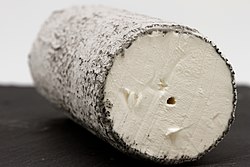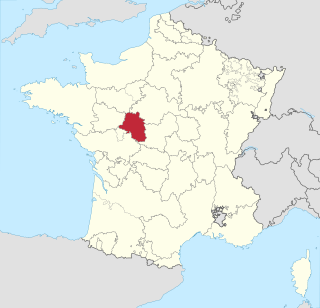
Touraine is one of the traditional provinces of France. Its capital was Tours. During the political reorganization of French territory in 1790, Touraine was divided between the departments of Indre-et-Loire, Loir-et-Cher, Indre and Vienne.

Goat cheese, or chèvre, is cheese made from goat's milk. Goats were among the first animals to be domesticated for producing food. Goat cheese is made around the world with a variety of recipes, giving many different styles of cheese, from fresh and soft to aged and hard.
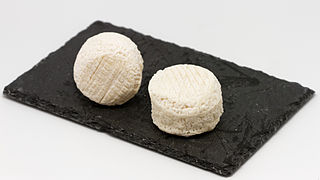
Crottin de Chavignol is a goat cheese produced in the Loire Valley. This cheese is the claim to fame for the village of Chavignol, France, which has only two hundred inhabitants.

The arrondissement of Chinon is an arrondissement of France in the Indre-et-Loire department in the Centre-Val de Loire region. It has 106 communes. Its population is 103,824 (2016), and its area is 2,296.5 km2 (886.7 sq mi).
The following is a list of the 19 cantons of the Indre-et-Loire department, in France, following the French canton reorganisation which came into effect in March 2015:
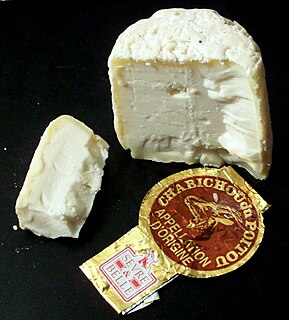
Chabichou is a traditional semi-soft, unpasteurized, natural-rind French goat cheese with a firm and creamy texture. Chabichou is formed in a cylindrical shape which is called a "bonde", per the shape of the bunghole of a gun barrel. and is aged for 10 to 20 days. It is the only goat cheese that is soft ripened allowed by Protected Designation of Origin regulations to be produced using pasteurized milk. Chabichou is very white and smooth, and flexible to the palate, with a fine caprine odor.
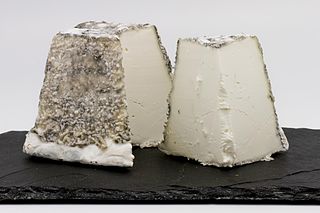
Valençay is a cheese made in the province of Berry in central France. Its name is derived from the town of Valençay in the Indre department.

Selles-sur-Cher is a French goat-milk cheese made in Centre-Val de Loire, France. Its name is derived from the commune of Selles-sur-Cher, Loir-et-Cher, where it was first made in the 19th century.
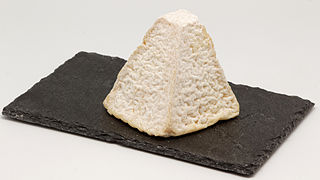
Pouligny-Saint-Pierre is a French goats'-milk cheese made in the Indre department of central France. Its name is derived from the commune of Pouligny-Saint-Pierre in the Indre department where it was first made in the 18th century.

Picodon is a goats-milk cheese made in the region around the Rhône in southern France. The name means "spicy" in Occitan.

Fourme de Montbrison is a cow's-milk cheese made in the regions of Rhône-Alpes and Auvergne in southern France. It derives its name from the town of Montbrison in the Loire department.
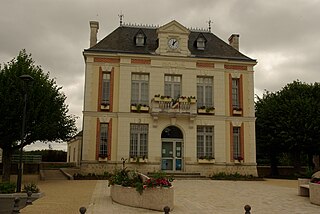
Chambourg-sur-Indre is a commune in the department of Indre-et-Loire in the region of Centre-Val de Loire, France.

Sainte-Maure-de-Touraine is a commune in the French department of Indre-et-Loire, Centre-Val de Loire.

Richelieu is a commune in the Indre-et-Loire department in central France.

Bourgueil is an appellation d'origine contrôlée (AOC) for wine in the Loire Valley region, and produces primarily red wine from the grape variety Cabernet Franc, located in the commune of Bourgueil and surrounding communes. Bourgueil gained Appellation d'Origine Contrôlée (AOC) status when regulatory laws were passed on 31 July 1937.

Touraine-Amboise is an Appellation d'Origine Contrôlée (AOC) for in the Loire Valley wine region in France. It is situated within the wider Touraine AOC wine appellation. It is produced by ten communes bordering both sides of the River Loire. To their west lies the town of Amboise with its famous royal château. Since its separation from the Touraine AOC in 1954, it has constituted an AOC in its own right. Annual production stands at 9,000 hectolitres of wine, spread between red, rosé, and still white wines. Effervescent wines are also produced within this AOC's boundaries, but they are not entitled to use the Touraine-Amboise appellation, belonging instead to the Touraine appellation.

Touraine is an Appellation d'Origine Contrôlée (AOC) in the Loire Valley wine region in France that produce dry, white wines and red wines rich in tannins. The AOC status was awarded by a decree of December 24, 1939. The wine-growing area extends over 5,300 hectares departments of Indre-et-Loire, Indre and Loir-et-Cher and comprises a total of 70 communes and it is thus a "subregional" appellation covering the same area as a number of local AOCs.
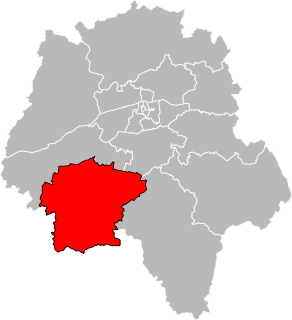
The canton of Sainte-Maure-de-Touraine is an administrative division of the Indre-et-Loire department, central France. Its borders were modified at the French canton reorganisation which came into effect in March 2015. Its seat is in Sainte-Maure-de-Touraine.

The 4th constituency of Indre-et-Loire is one of five French legislative constituencies in the Indre-et-Loire département.
